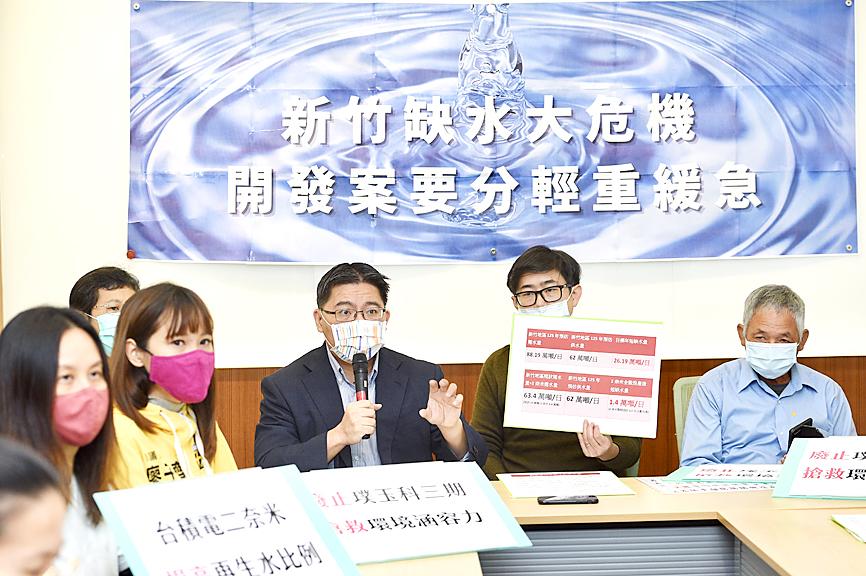The New Power Party (NPP) yesterday pledged its support to environmental groups and Hsinchu County residents in their decades-long fight against the expropriation of more than 400 hectares of land for the “Puyu Project” (璞玉, uncut jade) — the third phase of expansion at the Hsinchu Science Park.
NPP Legislator Chen Jiau-hua (陳椒華) said that government agencies aim to forcibly expropriate large tracts of farmland for the project, which spans the county’s Cyonglin Township (芎林) and Jhubei City (竹北).
“Officials call it development, but in reality, it will wipe out the farmers,” she told a news conference at the Legislative Yuan in Taipei.

Photo: Peter Lo, Taipei Times
“It also requires large-scale water storage, and farmers would have to stop their cultivation and all farming would cease... The IT sector has specific requirements for clean water, so we ask government agencies to stop deceiving people, and to impose strict conditions for assessing and approving the project,” Chen said.
NPP Legislator Chiu Hsien-chi (邱顯智) was more blunt.
“There is no need to expropriate more than 400 hectares of farmland. This project would benefit some people who would profit through land speculation,” he said.
Areas in Hsinchu County already face severe water shortages because of Taiwan Semiconductor Manufacturing Co’s (TSMC) planned 2-nanometer chip fab, Environmental Rights Foundation researcher Hsu Po-jen (許博任) said, adding that the region does not have the capacity to support another large-scale development.
TSMC’s 2-nanometer chip fab in Baoshan Township (寶山) would need 120,000 tonnes of water each day, which would further deplete the water supply, Hsu said, estimating that within three to five years, the whole Hsinchu area would have water shortages throughout the year.
“When water supply is short, it results in overuse and increased pollutants in the rivers,” Taiwan Clean Water Action Alliance chairperson Peng Kuei-chih (彭桂枝) said.
If TSMC draws 120,000 tonnes of water a day, it would worsen the already polluted Toucian River (頭前溪), which could dry up periodically, Peng said.
Liu Ching-chang (劉慶昌), one of the farmers heading the fight against the Puyu Project since 2004, said that if the Ministry of the Interior approves the project, “we will launch a lawsuit.”
“They must not expropriate farmland to build commercial buildings, and to release industrial waste into the Touchien River. The project must be dismantled, and the land returned to local residents,” Liu said.

A group of Taiwanese-American and Tibetan-American students at Harvard University on Saturday disrupted Chinese Ambassador to the US Xie Feng’s (謝鋒) speech at the school, accusing him of being responsible for numerous human rights violations. Four students — two Taiwanese Americans and two from Tibet — held up banners inside a conference hall where Xie was delivering a speech at the opening ceremony of the Harvard Kennedy School China Conference 2024. In a video clip provided by the Coalition of Students Resisting the CCP (Chinese Communist Party), Taiwanese-American Cosette Wu (吳亭樺) and Tibetan-American Tsering Yangchen are seen holding banners that together read:

UNAWARE: Many people sit for long hours every day and eat unhealthy foods, putting them at greater risk of developing one of the ‘three highs,’ an expert said More than 30 percent of adults aged 40 or older who underwent a government-funded health exam were unaware they had at least one of the “three highs” — high blood pressure, high blood lipids or high blood sugar, the Health Promotion Administration (HPA) said yesterday. Among adults aged 40 or older who said they did not have any of the “three highs” before taking the health exam, more than 30 percent were found to have at least one of them, Adult Preventive Health Examination Service data from 2022 showed. People with long-term medical conditions such as hypertension or diabetes usually do not

POLICE INVESTIGATING: A man said he quit his job as a nurse at Taipei Tzu Chi Hospital as he had been ‘disgusted’ by the behavior of his colleagues A man yesterday morning wrote online that he had witnessed nurses taking photographs and touching anesthetized patients inappropriately in Taipei Tzu Chi Hospital’s operating theaters. The man surnamed Huang (黃) wrote on the Professional Technology Temple bulletin board that during his six-month stint as a nurse at the hospital, he had seen nurses taking pictures of patients, including of their private parts, after they were anesthetized. Some nurses had also touched patients inappropriately and children were among those photographed, he said. Huang said this “disgusted” him “so much” that “he felt the need to reveal these unethical acts in the operating theater

Heat advisories were in effect for nine administrative regions yesterday afternoon as warm southwesterly winds pushed temperatures above 38°C in parts of southern Taiwan, the Central Weather Administration (CWA) said. As of 3:30pm yesterday, Tainan’s Yujing District (玉井) had recorded the day’s highest temperature of 39.7°C, though the measurement will not be included in Taiwan’s official heat records since Yujing is an automatic rather than manually operated weather station, the CWA said. Highs recorded in other areas were 38.7°C in Kaohsiung’s Neimen District (內門), 38.2°C in Chiayi City and 38.1°C in Pingtung’s Sandimen Township (三地門), CWA data showed. The spell of scorching